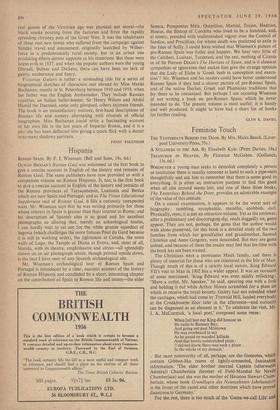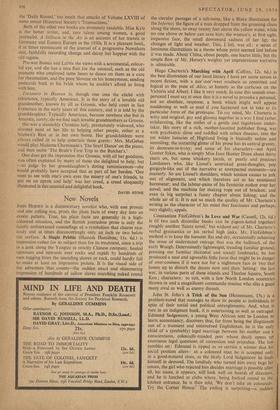Feminine Touch
WHENEVER a young man seeks to demolish completely a person or institution there is usually someone at hand to suck a pipe-stem thoughtfully and ask him to remember that there is some good in everything. It is often an instructive pastime to find this pod when all else around seems lost, and one of these three books, The Yesterdays Behind the Door, provides an admirable example
of the value of this attitude.
On a casual examination, it appears to be the worst sort of
biography : rambling, sycophantic, maudlin, snobbish, dull. Physically, even, it is pot an attractive volume. Yet as the reviewer,
after a preliminary and discouraging dip, reads doggedly on, gems appear. They are not, perhaps, the gems that the author would wish alone preserved, for this book is a detailed study of the two families from which her grandfather and grandmother, Samuel Christian and Anne Gregoire, were descended. But they are gems indeed, and because of them the reader may feel that his time with the book has not been wasted.
The Christians were a prominent Manx family, and there is
plenty of material for those who are interested in the Isle of Man. Though much of this is of a strictly local nature, King Edward VII's visit to Man in 1902 has a wider appeal. It was an occasion of some merriment. 'King Edward was even mildly rollicking : "Have a cutlet, Mr. Speaker," he said, spearing one with a fork and holding it out while Arthur Moore scrambled for a plate on which to receive the royal bounty. Gaiety had not subsided when the carriages, which had come by Tynwald Hill, landed everybody at the Cronkbourne door later in the afternoon—and curiosity can be diagnosed as an element in it.' To celebrate the visit, Mr, J. A. McCormick, 'a local poet,' composed some verse:
When [at] last our King did honour us He came to Ramsey Bay, And going out past Milntown
He was overheard to say
As he gazed on wooded hillside And that lovely outstretched plain: `I did not know there was such a place In the whole of my domain.'
But most noteworthy of all, perhaps, are the footnotes, which contain Gibbon-like reams of lightly-connected, fascinating information: `The elder brother married Captain (afterwards Admiral) Chamberlain (brother of Field-Marshal Sir Nevile Chamberlain) and she was the mother of Houston Stewart Chan•
berlain, whose book Grundlagen des Neunzehnten Jahrhunderts is the fount of the racial and other doctrines which have proved disastrous to Germany.'
For the rest, there is too much of the `Game-we-call Life' and
the 'Daily Round,' too much that smacks of Volume LXVIII of some minor Historical Society's 'Transactions.'
Both of the other two books are eminently readable. Miss Kyle is the better writer, and, rare talent among women, a good journalist. A Stillness in the Air is an account of her travels in Germany and Eastern Europe in the 1930s. It is a pleasant book, if at times reminiscent of the journal of a progressive Newnham don, faithfully recording change and decay but happier with the old regime.
Pre-war Bosnia and Latvia she views with a sentimental, colour- ful eye, and she has a nice flair for the unusual, such as the old peasants who employed tame bears to dance on them as a cure for rheumatism, and the poor Slovene on his honeymoon; sending postcards back to his bride whom he couldn't afford to bring with him.
Treasures in Heaven is, though one uses the cliché with reluctance, typically American. It is the story of a lovable old grandmother, known by all as Grossie, who held court in San Francisco in the early years of this century, and it is told by the granddaughter. Typically American, because nowhere else but in America, surely, do we find such lovable grandmothers as Grossie.
She was a staunchly Christian lady, prematurely widowed, who devoted most of her life to helping other people, either at a Seamen's Rest or in her own home. Her grandchildren were always called in to help entertain these guests : Mrs. McGehee would play Madame Chaminade's 'The Scarf Dance' on the piano, and then recite 'The Bride's First Trip to the Butcher's.'
One does get the impression that Grossie, with all her goodness, was often exploited by many of those she delighted to help; but —to judge by her . granddaughter's doting reminiscences—she would probably have accepted that as part of her burden. 'One went to see with one's own eyes the misery of one's friends, to put on an apron and help' was her creed, a creed eloquently illustrated in this unusual and delightful book.
DAVID STONE



































 Previous page
Previous page